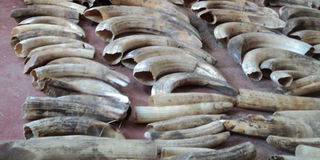Pangolins, hippo teeth most traded illicit wildlife products

Some of the recovered ivory and hippo teeth. PHOTO/FILE/ENID NINSIIMA
BY
KAMPALA. Pangolin scales, hippo teeth and big cat skins, are the most traded illicit wildlife products in Uganda, according to the Uganda Wildlife Authority (UWA).
Speaking during the African Regional Forum on Combating Wildlife Crime, Ms Margaret Kasumba, the UWA manager law enforcement, said the above in addition to game meat and lately poaching of giraffes for meat, skins and bones, which are used as walking sticks, constitute some of the most illegally traded wildlife products.
Uganda, she said, has been seeing a growing trend in illicit trade of wildlife products, noting that UWA currently holds stock piles of 19 tonnes of ivory and a spike in pangolin seizures.
The country, according to UWA, holds about 4,000 tonnes of pangolin scale seizures, fuelled by growing black market demand by wealthy funders.
The African Regional Forum on Combating Wildlife Crime seeks to strengthen mechanisms among African countries to support control of illicit trade in wildlife products and species.
The forum emphasises dialogue in a bid to find ways of sharing intelligence on how to handle seizure.
Mr Richard Nelson, the Usaid Uganda mission director, said illegal wildlife trade is not confined to a single territory, noting that it is a well-documented and planned global problem.
“It is a problem in East Africa and globally. Therefore, it is not enough for any single country to resolve the problem. It requires everyone right from source, transit and consumer countries,” he said.
Ms Kasumba also said funders of illicit wildlife trade take advantage of poverty in much of Africa, which is mainly the source of illegal wildlife products, to fuel the vice, killing thousands of wildlife in the process.
“For someone who works for less than Shs10,000 a day, is given Shs5m to get into the trade. People have been lured to participate, because of money. Thus funders have found their way through corrupting [everyone and top] officials in government,” she said.
Mr George Oweyesigire, the Ministry of Tourism assistant commissioner wildlife conservation, said Uganda has suffered wildlife poaching since 1970s but there has been a growing large scale seizures of illegal wildlife products.
strengthening the law
Government, according to Mr Oweyesigire, has strengthened penalties and prison sentences for dealing in illicit wildlife trade. For instance, he says, wildlife Act of 2019 has been revised to incorporate heavy penalties, among which include Shs20b penalty or life imprisonment for anyone convicted of dealing in outlawed wildlife products.




